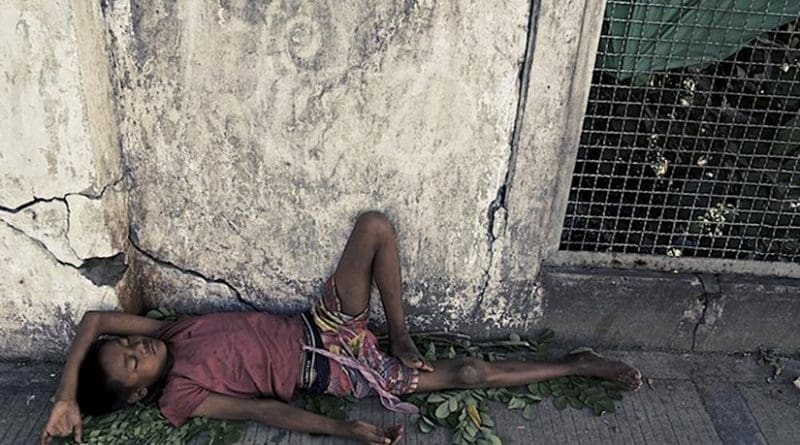Rohingya Crisis Demands Action – OpEd
By Yasir Malik*
We live in a world where there is enough wealth and technological innovation to address the worst humanitarian disasters, but what’s lacking is the will to tackle these tragedies with long-term solutions. When there should be concrete efforts to end suffering, increasingly resources are being allocated to fund proxy wars. The Muslim community around the world is circumscribed in a vicious circle of persevering crises, one after the other. Ranging from the Arab Spring to startling radicalism by an alleged Islamic Group in Iraq and protracted conflict in Afghanistan to the barbaric massacre in Syria, and now violence in Myanmar has flared up and is making headlines.
It’s like a big crime in Myanmar to be Muslim. The Rohingyas are a Muslim minority in the northern Rakhine state of Myanmar, which used to be called Burma. According to the UN, Rohingyas are one of the most persecuted minorities on the planet who are being terrorized to wipe out their population. The Myanmar government does not recognize them as citizens and says they are illegal immigrants from Bangladesh. Nay San Lwin, one of the Rohingya’s activists evidently claimed that they have been residing in the Arakan state since the 7th century. Rohingyas are living in apartheid conditions and are often subjected to state-led massacres. Academics and scholars are citing this brutal ethnic cleansing of Rohingya as genocide. Of 1.3 million Rohingya, only 40,000 have citizenship, the rest are considered stateless. A 1982 Citizenship law stated, Rohingyas can become citizens only if they prove their ancestors were in the country prior to 1832, but government-backed militias made this difficult by razing Rohingya villages. The army has been accused of running a brutal campaign of oppression against them.
Rohingyas have also been discriminated against by Buddhist nationalists who think that Rohingya Muslims pose a demographic and cultural threat and fear Islam will take over Myanmar. The nationalist Buddhist campaign “99” spreads hate-speech against minorities in Myanmar. Ashin Wirathu, leader of 969 Nationalist Movement has been quoted as saying, “Muslims are only well-behaved when they are weak, when they become strong, they are like a wolf or Jackal; in large packs they hunt down other animals.”
The conflict between Buddists and Mulims got worse in 2012. Deadly riots broke out in Rakhine state after reports that a Buddhist woman was gangraped by Muslim men. 57 Muslims and 31 Buddhists were killed, leading to a military crackdown on the Rohingya. The military crackdown has led to one of the deadliest bouts of violence to engulf the Rohingya community in decades, forcing 140,000 Rohingya out of their homes. Nearly 400 people have died in fighting that has embroiled Myanmar’s northwestern state for a week.
Walking through the flooded field and crossing mountains, almost 270,000 Rohingya have, so far, fled to Bangladesh, escaping from severe persecution, rape and arson by both the Burmese military and Buddhist militia. The zenith of suppression witnessed Myanmar forces opening fire on Rohingya civilians as they tried to pass through the border to Bangladesh to flee the violence.
Aung San Su Kyi, state counsellor of Myanmar and a controversial figure who leads the Buddhist majority country, has turned a blind eye to the ethnic cleansing of Rohingya Muslims. Su Kyi has refused to acknowledge the plight of the Rohingya and said that the reports are exaggerated and distorted. Disclosing drastic genocide in Myanmar, Phil Robertson, Deputy Asia Director, Human Rights Watch said that the biggest concern is, “Myanmar government is not doing enough to rein in the military and basically take control of the situation”. Bangladeshi hospitals are copiously packed by refugees with diverse and multiple gunshot injuries. Despite of overwhelming human rights violations under her nomenklatura, the Noble Peace Prize winner and daughter of Burma’s founding father Aung San, is still in her spiritless mood.
Fed-up and downtrodden Rohingya want a safe zone and international intervention to ease their torments. The United Nations wants Myanmar to accept the stateless Rohingya Muslims as citizens and customarily considers in the case of Muslims, it’s mellow rhetoric enough to be relieved from this liability. Although the desire to end the Rohingya crisis has been resonated by an assortment of many world leaders from Malaysia’s Prime Minister Najib Razak to Turkey’s President Recep Tayyip Erdogan, yet the intensity of the crisis requires synergetic action by almost all the Muslim countries particularly or by the potent international governments to put pressure on the Rohingya’s de-facto regime to control the situation. Although a worldwide campaign demanding to impound Su Kyi’s Noble Peace Prize is underway the solution does not lies in executing this option.
Turkey has gone beyond its means to help the oppressed Rohingya, bestowing thousands of tons of aid and triggering eloquent diplomatic actions to pacify this emergency. However, contemptuous and unaccommodating attitude of the West towards the worst abasement of humanity for the Rohingya puts the intentions of nominating Noble Peace Prize conferment custom at question.
*Yasir Malik, Research Fellow at South Asian Strategic Stability Institute, Islamabad

